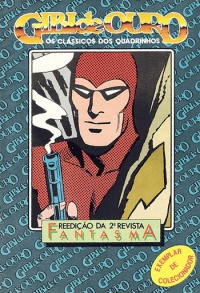Gibi de Ouro: Difference between revisions
mNo edit summary |
mNo edit summary |
||
| (One intermediate revision by the same user not shown) | |||
| Line 1: | Line 1: | ||
{{Series | {{Series | ||
|Title= Gibi de Ouro<br>Os Clássicos dos Quadrinhos | |Title= Gibi de Ouro<br>Os Clássicos dos Quadrinhos | ||
|image= [[Image:Gibi-de-ouro-01. | |image= [[Image:Gibi-de-ouro-01.jpg|200 px]] | ||
|Sample= First issue | |Sample= First issue | ||
|Country= [[Image:mini_brazil.gif]] Brazil / Portuguese | |Country= [[Image:mini_brazil.gif]] Brazil / Portuguese | ||
| Line 9: | Line 9: | ||
|Format= 18×30 cm, b/w | |Format= 18×30 cm, b/w | ||
|}} | |}} | ||
'''Gibi de Ouro''' was a Brazilian comic book series, published by [[RGE]] in 1985. | '''Gibi de Ouro''' was a Brazilian comic book series, published by [[RGE]] in 1985. | ||
==Issue overview== | ==Issue overview== | ||
===Regular series=== | ===Regular series=== | ||
In 1980 RGE released a reprint of their first [[The Phantom|"Fantasma magazine"]] from 1953, adding a new outer cover on the magazine. The same concept was used in 1985, for the '''Gibi de Ouro''' series. This collection series reprinted the first issues of six series: "Fantasma ''(The Phantom)'', "Mandrake", "Buffalo Bill", "Nick Holmes ''(Rip Kirby)''", "Ferdinando ''(Lil’ Abner)''", "Cavaleiro Negro ''(Black Rider)''". Note that the Phantom issue in this series is the second "Fantasma" issue, since the first one had been reprintet as [http://www.phantomwiki.org/Fantasma_Especial_(RGE) Fantasma Especial] in 1980. | |||
In addition to the new outer covers for the series there are two things that distinguish the reprint from the original magazines. All have ekstra pages in the middle, presenting the series; character and the creators. And the ads on the original back covers are replaced with an ad from Revel. | |||
<gallery> | <gallery> | ||
Image:Gibideouro.png|<center>[[Gibi de Ouro 2|''Gibi de | Image:Gibi-de-ouro-01.jpg|''reprint of''<br>#2 1953 | ||
Image:Gibideouro.png|<center>[[Gibi de Ouro 2|''reprint of''<br>#1 1953]] | |||
Image:Gibi-de-ouro-03.jpg|''reprint of''<br>#1 1954 | |||
Image:Gibi-de-ouro-04.jpg|''reprint of''<br>#1 1956 | |||
Image:Gibi-de-ouro-05.jpg|''reprint of''<br>#1 1961 | |||
Image:Gibi-de-ouro-06.jpg|''reprint of''<br>#1 1956 | |||
</gallery> | </gallery> | ||
{{Brazil}} | {{Brazil}} | ||
[[Category:Gibi de Ouro issues| ]] | [[Category:Gibi de Ouro issues| ]] | ||
Latest revision as of 14:04, 5 April 2020
| Gibi de Ouro Os Clássicos dos Quadrinhos | |
 First issue | |
| Country/language: | |
|---|---|
| Publishing company: | RGE |
| Publishing years: | 1985 |
| Issues: | 6 |
| Format: | 18×30 cm, b/w |
Gibi de Ouro was a Brazilian comic book series, published by RGE in 1985.
Issue overview
Regular series
In 1980 RGE released a reprint of their first "Fantasma magazine" from 1953, adding a new outer cover on the magazine. The same concept was used in 1985, for the Gibi de Ouro series. This collection series reprinted the first issues of six series: "Fantasma (The Phantom), "Mandrake", "Buffalo Bill", "Nick Holmes (Rip Kirby)", "Ferdinando (Lil’ Abner)", "Cavaleiro Negro (Black Rider)". Note that the Phantom issue in this series is the second "Fantasma" issue, since the first one had been reprintet as Fantasma Especial in 1980.
In addition to the new outer covers for the series there are two things that distinguish the reprint from the original magazines. All have ekstra pages in the middle, presenting the series; character and the creators. And the ads on the original back covers are replaced with an ad from Revel.





